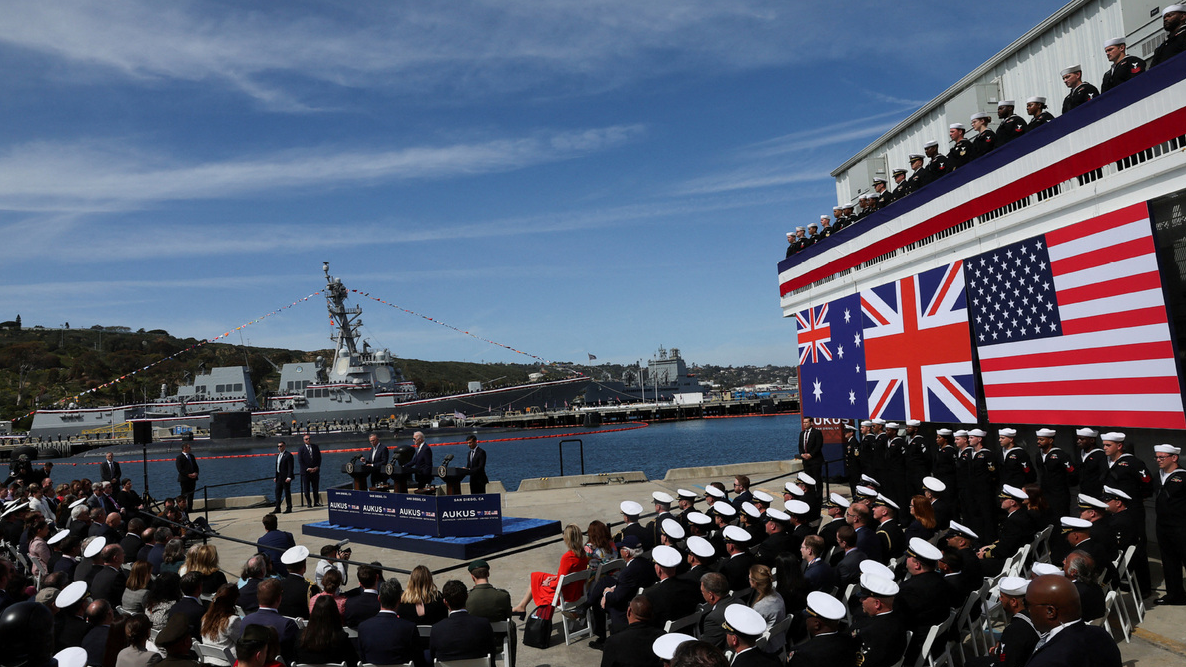
An updated agreement tabled in the Australian parliament on Aug 12 has done nothing to dispel fears that the controversial $368 billion AUKUS nuclear submarine deal is guaranteed.
Under the AUKUS agreement – which comprises Australia, the United Kingdom and the United States – the UK or the US can withdraw from the agreement by giving a year’s notice.
The deal calls on the US and the UK to “not unreasonably” withhold information, material or equipment, and the understanding can be voided if it adversely affects the ability of the partner countries to “meet their respective military requirements” or if it degrades their “respective naval nuclear propulsion programs”.
The revelation has sparked a renewed political storm over Australia’s sovereignty and forced the government of Prime Minister Anthony Albanese on the defensive.
ALSO READ: AUKUS distorts deterrence into aggression
Former Australian prime minister Paul Keating has weighed in on the debate with a stinging attack on the government and its relationship with the US.
In an interview with the Australian Broadcasting Corporation on Aug 8, Keating, who was the Labor prime minister from 1991-96 said the submarine deal will turn Australia into the “51st state of the United States”.
He described the current Labor government as a “sellout”.
“In defense and foreign policy, this is not a Labor government. This is a party which has adopted the defense and foreign policies of the Morrison Liberal government,” he said.
Morrison, who was prime minister from 2018-22 was the prime mover of the AUKUS deal.
Keating , who has been a critic of the AUKUS deal from its inception, called it the “worst deal in history”.
“This government has sold out to the United States,” he said.
The agreement is “full of holes” said former diplomat and past president of Australians for War Powers Reform, Dr Alison Broinowski.
ALSO READ: China-Australia High Level Dialogue held in Australia's Adelaide
Under the AUKUS agreement announced in San Diego, in the US in 2023, Australia will buy at least three Virginia class submarines from the US in the 2030s while nuclear powered submarines are built.
The nuclear submarines are dependent on US naval shipyards and the US navy’s submarine program.
Broinowski told China Daily the out clause “appears to mean the US or UK”.
“It also appears to leave Australia responsible for all the costs from the start of the program until that date (of termination),” she said.
Broinowski said the Defense Minister Richard Marles has said no nuclear waste will be stored in Australia.
“But there is no clarity about how or where that waste is generated. It could involve waste from US operations in Fremantle (Western Australia) or Darwin or elsewhere,” she said.
She added the agreement matches the ANZUS security treaty “in obliterating Australia's independence and security”.
“Australians are being underinformed or deceived by the government they elected,” she said.
Dr Marty Branagan, senior lecturer in peace studies at the University of New England in the Australian state of New South Wales, said former prime minister Keating described the AUKUS deal as the largest defense project since World War II and the worst foreign policy mistake since a failed bid to introduce conscription during WWI.
“The agreement came about with no public consultation, supported by a ‘Red Alert’ series of fearmongering front-page articles in Australia’s ‘Nine’ newspapers in consultation with the Australian Strategic Policy Institute, which has close ties to arms dealers, and which argued for greater defence capabilities to resist a supposedly imminent war with China,” he told China Daily.
“Yet China and Australia have a mutually beneficial trade relationship which this deal will harm.
“It will contribute to a regional arms race which could have disastrous consequences. It is already shifting valuable resources away from the more pressing threat of global warming facing both countries,” he said.
Greens defense spokesman David Shoebridge said the agreement was riddled with “multiple escape hatches” for the US.
He said Article 1 of the new AUKUS agreement says that if at any point the US thinks supplying material under the AUKUS agreement to Australia prejudices their defense, they can effectively terminate the agreement and pull out.
Shoebridge called on the government to be “honest about the size of the gamble”.
Branagan at the University of New England said the anti-AUKUS campaign is growing around Australia.
“The growing national movement wants an end to AUKUS, claiming that its cost and the open-ended commitment to foreign military priorities are to the detriment of priorities for a resilient, safe and peaceful Australian society,” Shoebridge said.


